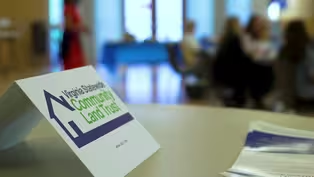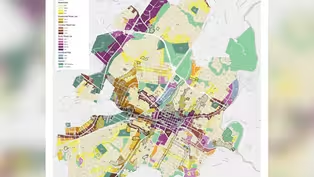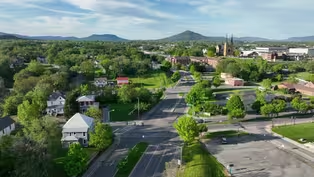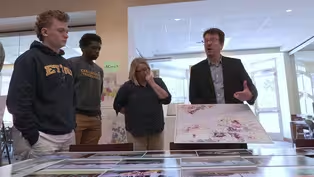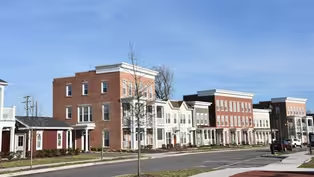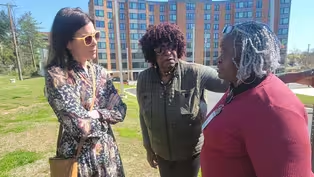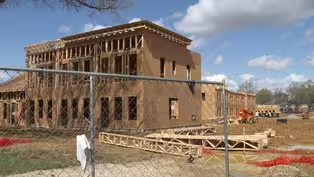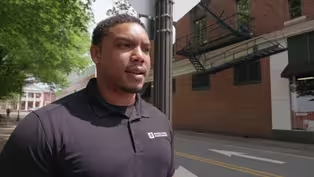VPM News Focal Point
Community-based solutions to Virginia’s eviction crisis
Clip: Season 3 Episode 9 | 13m 28sVideo has Closed Captions
A United Way pilot program helps families avoid eviction and move out of poverty.
Five Virginia cities out of 10 nationwide, are in the top tier of cities that evict people. Charvalla West Interim CEO of the United Way of the Virginia Peninsula talks about a pilot program that works to mitigate evictions and help families find pathways out of poverty. The Community Assistance Network provides access to more than 150 partners who provide basic needs and stabilization supports.
Problems playing video? | Closed Captioning Feedback
Problems playing video? | Closed Captioning Feedback
VPM News Focal Point is a local public television program presented by VPM
The Estate of Mrs. Ann Lee Saunders Brown
VPM News Focal Point
Community-based solutions to Virginia’s eviction crisis
Clip: Season 3 Episode 9 | 13m 28sVideo has Closed Captions
Five Virginia cities out of 10 nationwide, are in the top tier of cities that evict people. Charvalla West Interim CEO of the United Way of the Virginia Peninsula talks about a pilot program that works to mitigate evictions and help families find pathways out of poverty. The Community Assistance Network provides access to more than 150 partners who provide basic needs and stabilization supports.
Problems playing video? | Closed Captioning Feedback
How to Watch VPM News Focal Point
VPM News Focal Point is available to stream on pbs.org and the free PBS App, available on iPhone, Apple TV, Android TV, Android smartphones, Amazon Fire TV, Amazon Fire Tablet, Roku, Samsung Smart TV, and Vizio.
Providing Support for PBS.org
Learn Moreabout PBS online sponsorshipANGIE MILES: Many cities across Virginia are dealing with a shortage of available, affordable rental homes, and renters who can't keep up with the increasing cost do sometimes face eviction.
Charvalla West is the interim CEO of the United Way of the Virginia Peninsula, which runs the Peninsula Eviction Reduction Program.
Thank you so much for joining us, Charvalla.
CHARVALLA WEST: Thank you for having me.
ANGIE MILES: So I'd like to actually start by talking a little bit about public housing, because, it has really been evolving.
We are seeing across the state, and across the nation, housing authorities moving away from what was thought of as traditional public housing, and moving towards partnerships, mixed income, mixed-use developments, with services, more on site for renters and for families.
healthcare services, childcare services, sometimes food, grocery stores, that sort of thing.
How does that impact your work at the United Way, and your efforts to help people find pathways out of poverty?
CHARVALLA WEST: I think it's a heavy lift for any community that's considering the work of revitalizing public housing.
I think it's necessary to ensure that everyone has a safe home, in a safe neighborhood that they can afford.
I think there are a lot of benefits to having more integrated communities where there's not a concentration of poverty.
I think we've seen the consequences of that.
But, it is complicated, and it is hard for the families who have to find other means, other places to call home, in the in-between time.
We've been very fortunate to participate with our local housing authorities and their partners, as folks are finding their way through this process over the last few years.
And we are hopeful, but it's really going to take all of us supporting these families along the way, to make sure that they do find the stability we all intend for them to have in the end.
ANGIE MILES: So, no matter how grand a vision is, there's likely to be some bumpiness along the way, right, to get to that vision, and you've just touched on what one of the issues is here.
As these developments are revitalized, remodeled, sometimes demolished, in order to build something new, those residents have to go somewhere, and there are a number of programs in place to help them to relocate temporarily, but that doesn't seem to be perfect.
Right, some of them don't come back to public housing, or don't choose to, some of them may want to, but, maybe there are not enough units.
Again, how does that intersect with what you're doing at the United Way?
CHARVALLA WEST: So I think it's important to recognize that sometimes when this happens, we're taking people out of their neighborhood, sometimes their generational neighborhood, where they have lived and their families have lived for a very long time, and there's an adjustment that has to happen.
It also changes what is available to a family, where maybe I could walk to the grocery store before or to the corner store, that may not be an option.
Maybe changes in schools, for children who are going to and from different neighborhoods.
And then once the housing is rebuilt, to have a more diverse income community, means that there are less units there for people who had lived there before.
So, there is some choice in that, of course, as people decide to stay or come back.
And so wherever they are, we need to make sure that they have access to the resources that can stabilize them during the transition, and most importantly, once that project is complete, are all of the folks who live there before going to be okay?
ANGIE MILES: Yeah.
Of course, everyone is hoping for the best outcomes, but we also have to prepare for or mitigate against some of the worst outcomes, and that is one of the things that you do.
We understand that, typically, or consistently rather, on the list of top evicting cities in America, in the top 10, five of those tend to be Virginia cities.
So five Virginia cities out of 10 nationwide are in the top tier of cities that evict people.
You, uniquely, have a program to help mitigate evictions, talk about that program.
CHARVALLA WEST: So two of those top 10 cities are right on the Virginia Peninsula, Newport News and Hampton.
The Virginia Peninsula is nine cities and counties, and it's very diverse, from more urban areas like Newport News and Hampton, to more suburban areas like the Greater Williamsburg area, and even some rural parts, in Gloucester and Matthews.
And what we have found over the last four years of administering the first ever Peninsula Eviction Reduction pilot, is that the landscape for housing has changed, and so how we respond to housing instability and eviction has to change with it.
One of the things that we've been able to do through this pilot, is really address the system in which all of us are navigating housing stability.
There are programs, and have been programs, particularly through the pandemic, that provided financial assistance, and temporary relief.
And what we saw, once those programs ended, is that evictions increased to the same levels they were pre-pandemic, if not higher.
At the same time, the cost of rental housing has increased, in some areas, more than 40%, of what it was just two years ago.
And so how we as a community respond to that, has to look differently than it did pre-pandemic.
So what we've done at United Way is we administer this pilot on behalf of the entire community, and we engage partners from the sheriff's department, who have to execute evictions, our local judges and attorneys, landlords, tenants, the nonprofit and human services community.
All of us are working together to look at what we can do differently to help stabilize folks who are struggling to pay their rent.
One of the ways we do that at United Way is we provide an advocacy and referral service called the Community Assistance Network.
It provides access to more than 150 partners across our community who are working to keep people housed, make sure they have basic needs, and provide some other stabilization supports.
So whether you live in Newport News and work in Hampton or work in Williamsburg and live in Newport News, you have one phone number that you can call to access all that's available to you, all that you're eligible for.
And because most of the families who are renting, facing eviction are also working, we do the legwork on behalf of those families.
So instead of "Here's a list of phone numbers to call," our team of advocates actually makes the calls for you, we connect with those partners, we provide the information they need so that you only have to tell that story one time.
And then we take all of the resources in our community that are available, we put them together to help stabilize that family.
In addition to that, we provide an eviction court navigation service that puts a human in the courtroom.
So when you're missing time from work to come to a courtroom and you're afraid and don't quite understand all the legal jargon, there's a human there who can say "This is what this means for you and your family.
Here are your rights, here are your options, and here's how the community can help you."
We've been able to do that, not just with tenants, but some of the landlords as well.
We've also been able to improve how we look at housing instability.
And not just measuring the number of filings or unlawful detainers, but also looking at the number of people who are actually losing their housing.
And then from there, measuring the effectiveness of our interventions to keep people housed once they are facing that unlawful detainer.
ANGIE MILES: And unlawful detainer, you want to clarify, is not the equivalent of an eviction, it's the first step.
CHARVALLA WEST: That's correct, so many tenants receive the notice that I have to go to court because I'm behind on my rent, and feel there's no recourse.
But that's only the first step, showing up to court can make a huge difference.
Talking to the landlord can make a huge difference.
And many residents and tenants don't realize that they can do that, or maybe they're afraid to, and that's where the eviction court navigation services, and the advocacy services that we provide, really can make a huge difference.
ANGIE MILES: And it's good to hear that you have people from all sides of the issue joining forces in partnership.
It's hard to believe that anyone delights in eviction, that anyone prefers that.
People would rather be paid, if they're landlords, people would rather not have to serve notices if they're in law enforcement.
People would rather have stable housing if they're having difficulty.
And it's good that you're addressing all of those different areas.
Who is the most likely person to receive an unlawful detainer notice, and be put on that path to eviction, or maybe evicted?
CHARVALLA WEST: So, I do want to respond first to your statement.
If we think about eviction as a traumatic event, being behind on your rent or not receiving rent as stress, the amount of toxic stress and trauma that's impacting so many people that you just mentioned in our community, really is making a difference in how we show up every day.
And so it's really important that we recognize that we are talking about people's lives, we're talking about children who are trying to go to school and get off the school bus at a place that they call home.
And so to answer your question, the two highest indicators for eviction are race and the presence of children.
In any community across the country, you will find that the most likely to be evicted are single mothers of color with children.
So when we talk about educational outcomes, when we talk about health outcomes, when we talk about community safety, we have to start by talking about stabilizing housing for people who need us.
ANGIE MILES: And certainly, it would be women of color who are single parents as much as anyone, needing security and stability in housing.
Your program is uniquely serving the Peninsula.
And you mentioned Hampton and Newport News, who are on the list of the top 10 cities for evictions pretty consistently.
Also, we should mention Richmond, Norfolk, and Chesapeake.
are also on that list.
Wouldn't it be wonderful if all of Virginia, if not all of the country, but if all of Virginia had access to resources such as what you are providing.
Is that starting to happen, perhaps?
CHARVALLA WEST: So, we're hopeful, and I think it's important to recognize that this is, we're in our fourth year of the pilot.
And not only can we talk about the number of people we've been able to help, which is phenomenal, we've been able to serve over 8,000 people in less than four years through this pilot.
But we can see the outcomes of the work that we're doing as a community.
We can see that in communities that work together, we can stabilize housing even when there is an unlawful detainer filing.
And while we are grateful for the support from the Department of Housing and Community Development to start and support this work, we've been able to leverage that with resources that were already in existence in our community.
And so with that, we've shared with the Virginia Housing Commission, and United Ways of Virginia, that through resource connection, through advocacy and referral, every community has a local United Way that can mobilize these resources in your respective community to make a huge difference.
ANGIE MILES: Okay, because this conversation could go on forever (chuckles), how can people find out more about what you offer, and how they might actually start a similar program where they are?
CHARVALLA WEST: So the Department of Housing and Community Development lists information around eviction reduction, as well as other resources, on the Virginia Peninsula, United Way is a phone call away.
(chuckles) Or, of, course you can go to our website, uwvp.org.
ANGIE MILES: Okay, thank you so much for this enlightening conversation and for the good work that you're doing to help people, so, we appreciate it, sure.
CHARVALLA WEST: Thank you, it's been truly a pleasure.
ANGIE MILES: Alright.
CHARVALLA WEST: Thank you.
ANGIE MILES: Charvalla West, thank you for joining us.
Video has Closed Captions
Clip: S3 Ep9 | 4m 46s | Community Land Trusts Aim to Innovate for Affordability (4m 46s)
Charlottesville’s new zoning ordinance sparks lawsuit
Video has Closed Captions
Clip: S3 Ep9 | 1m 55s | Charlottesville facing lawsuit as residents sue over newly implemented zoning ordinance (1m 55s)
Harmful history of urban renewal
Video has Closed Captions
Clip: S3 Ep9 | 5m 39s | Many Roanoke residents are still haunted by their memories of urban renewal. (5m 39s)
Video has Closed Captions
Clip: S3 Ep9 | 4m 14s | An exhibit shows the impacts of redlining, a discriminatory housing practice, with a series of maps. (4m 14s)
The metamorphosis of public housing
Video has Closed Captions
Clip: S3 Ep9 | 11m 36s | What was public housing is shifting to affordable housing. Managers lay out the vision. (11m 36s)
New partners in public housing redevelopment
Video has Closed Captions
Clip: S3 Ep9 | 6m 55s | When private donors and public housing residents come together, they find new ways forward (6m 55s)
The promises of public housing
Video has Closed Captions
Clip: S3 Ep9 | 7m 42s | Are those who’ve relied on public housing reaping benefits from redevelopment. (7m 42s)
Revitalizing Martinsville: local man is catalyst for change
Video has Closed Captions
Clip: S3 Ep9 | 3m 33s | A VMI Cadet returns to Martinsville to help revitalize his hometown and mentor others. (3m 33s)
Providing Support for PBS.org
Learn Moreabout PBS online sponsorship
- News and Public Affairs

Top journalists deliver compelling original analysis of the hour's headlines.

- News and Public Affairs

FRONTLINE is investigative journalism that questions, explains and changes our world.












Support for PBS provided by:
VPM News Focal Point is a local public television program presented by VPM
The Estate of Mrs. Ann Lee Saunders Brown
